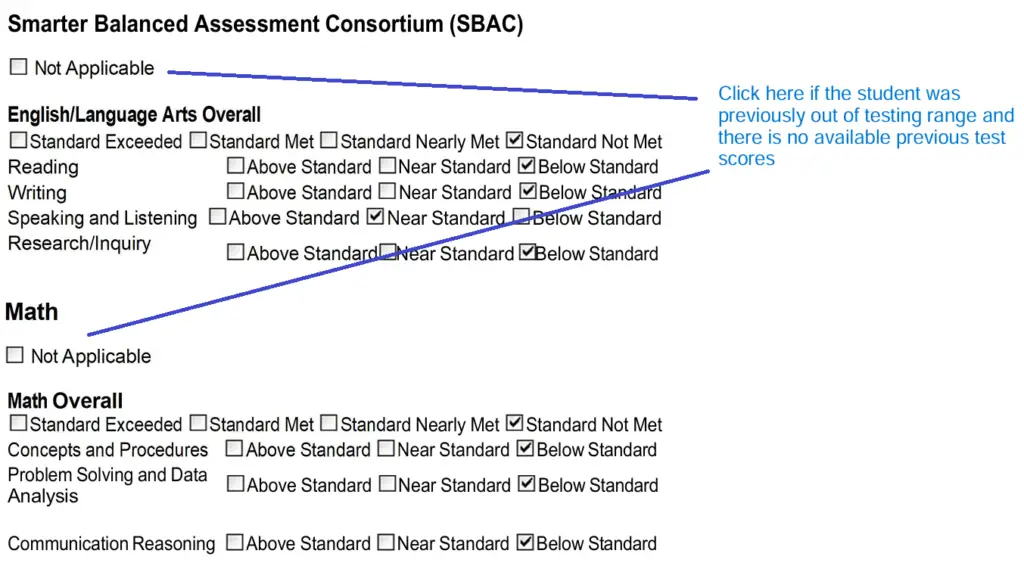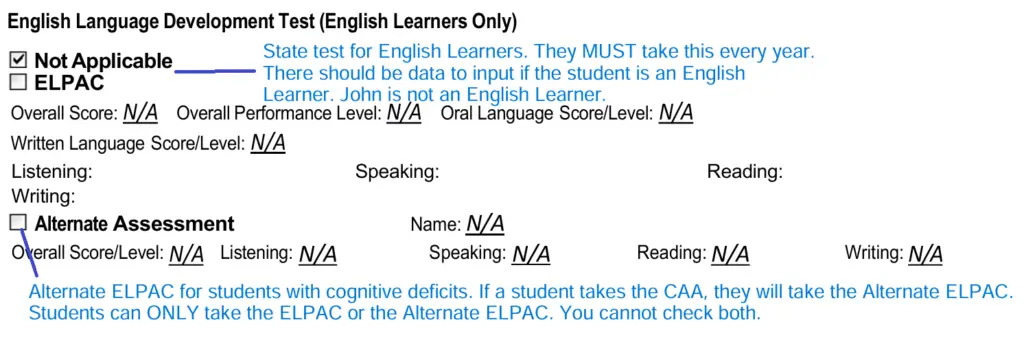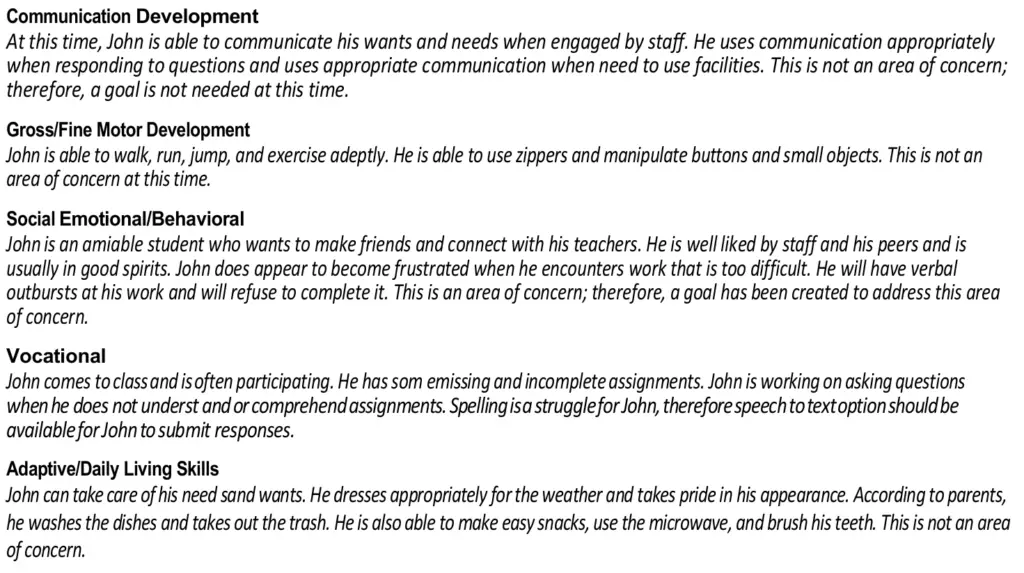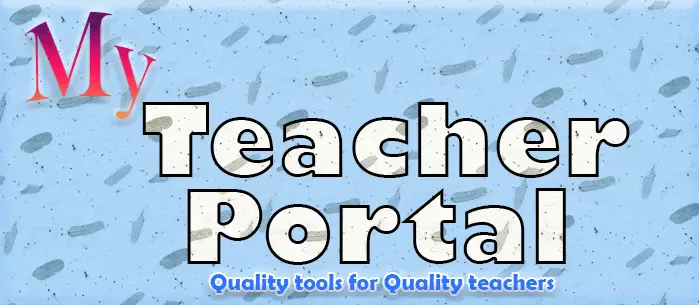Present Levels
What is the Present Levels Page?
Present Levels, or Present Levels of Performance (PLOP), is like a snapshot of the current abilities, past assessments, and current areas that the student is struggling in (areas of need). Think of it as a page that shows who the student is and where we are going from here. The sections that follow will break down each area of the Present Levels page and what these sections represent.

Strengths/Preferences/Interests
Strengths/Preferences/Interests should be the starting point of your dive into the IEP. It should be rich in information about the student. This is a good way to start the IEP off on the right foot to begin with positive information. There should be NO negative or demeaning information.
For Questionnaires that students can fill out to help get to know them, CLICK HERE.
Ask yourself these questions when filling out this section:
Learning Style:
Does the student work better alone or with others?
Is the student a visual or auditory learner?
Does the student work well over long periods or with frequent breaks?
Academics:
What is the students favorite or strongest subject?
Is the student confident in working on particular assignments?
Is the student receiving a decent or remarkable grade in any subject?
Hobbies:
Does the student have a genre of TV/Youtube they like watching?
What does the student do when they have free time?
Has the student expressed any interests that they might want to look into but have never tried?
Specific:
Does the student have a favorite toy or video game?
Is there something the student is hyper-focused on (some Autistic students love trains)?
Is there a place parents/guardians take student to that they love?

Parent Input and Concerns
Parent Concerns is a section where the IEP facilitator asks the parent for input about their student. This ranges from parents usually having no concerns to the meeting coming completely “off the rails”. The best way to ensure this portion goes smoothly is to start by having good communication with the parent/guardian beforehand and having a proactive response to their needs and concerns throughout the school year.
In the worst case scenario, if the parent/guardian is truly unhappy and wishes to use this section as a podium to issue-dump or make accusations, your job is to attempt to move the meeting onward.
Use terms like:
“Perhaps some of these issues will be addressed in the later sections.”
“I completely understand how you feel and I assure you we’ve taken some of these concerns into mind when developing this IEP.”
The meeting should then immediately move forward on to the next sections without pause.

Smarter Balance Assessment Consortium
The Smarter Balance Assessment Consortium (SBAC) is the state test that covers ELA, Math, and Science. It is held between grades 3 to 8 and grade 11. If the student has just entered grade 3, they won’t have previous data and the box should be checked “Not Applicable”. Meet with your local school district or administrator to find out how to access the previous test scores.
Students that take the SBAC are students that do not have extensive cognitive deficits and are usually considered to be on the Diploma track. Students that take the SBAC DO NOT take the California Alternate Assessment (CAA). The SBAC can be administered virtually or in-person depending on your school’s decision.

California Alternate Assessment
The California Alternate Assessment (CAA) is the state test that covers ELA and Math. It is held between grades 3 to 8 and grade 11. If the student has just entered grade 3, they won’t have previous data and the box should be checked “Not Applicable”. Meet with your local school district or administrator to find out how to access the previous test scores.
Students that take the CAA are students that have extensive cognitive deficits and are usually considered to be on the Certificate of Completion track. Students that take the CAA DO NOT take the SBAC. The CAA can ONLY be administered in-person.

English Language Proficiency Assessment for California and Alternate Assessment
The English Language Proficiency for California (ELPAC) test is used to assess students K-12 of whom their native language is not English. This test is administered every year with no exceptions or waivers. An English Language Learner should ALWAYS have previous testing data. Please contact your school district or administrator on how to access these scores. The ELPAC is administered to students that have no extensive cognitive deficits.
ELPAC Alternate Assessment is an ELPAC test for students with extensive cognitive deficits.

PE Testing is administered by the home school unless otherwise designated. See school district for test results.

Other Assessment Data
Schools use assessments to gauge how the students are doing throughout the year for academic growth. These assessments are no tied to their letter grades, but are instead used as a benchmark to determine effectivity of curriculum and instruction. Other Assessments is a section to record the results of these benchmarks. They are typically standardized (meaning they are matched up to students of similar grades). Here are a few examples:
NWEA Map Testing: Mild/Mod academic assessment based on “Measures of Academic Progress (MAP)”
IXL.com: Mild/Mod Academic Assessment that is web embedded with some enhanced tools for displaying information.
SANDI: Student Annual Needs Determination Inventory (SANDI). An assessment for extensive support needs students that uses Standards Reports and Performance Items by Level.

Hearing and Vision Report
Hearing and vision must be screened during every evaluation process on each 3rd year (a triennial). A school medical professional must conduct this screening. Some school districts will allow the use of a private health screener as long as the proper documentation is recorded. This is in very rare circumstances and should always be approved by school administration.

This is the meat of the present levels page. It explains where the student is in their learning process. It is split into 3 separate areas.
Preacademic
Pre-academic skills are the knowledge and skills children develop before starting formal school.
- Language developmentThis includes early literacy skills like being interested in books, retelling stories, or scribbling. Writing is also a pre-reading skill because it requires similar knowledge of letters, sounds, and phonics.
- MathThis includes early math skills like number sense, operations, patterns, spatial relations, and measurement.
- Social-emotional developmentSocial skills can help children build healthy relationships, regulate their emotions, and get their needs met.
- Other skillsThese include matching forms and letters, understanding one-to-one correspondence, and completing sequences.
Academic
Academic skills are the knowledge and skills students develop in school.
In addition to Reading, Writing, and Math skills, this may also include:
- Study skillsActive behaviors like time management, note-taking, active reading, and memorization
- Research skillsEvaluating sources and referencing
- Communication skillsWritten and verbal communication, including critical and reflective writing and presentation skills
- Other skillsTechnical literacy, attention to detail, data analysis, critical thinking, and editing
Functional Skills
Functional skills are skills that help children with disabilities learn how to live independently and participate in everyday life.
- Daily livingTurning off an alarm, brushing teeth, taking a shower, getting on and off the bus, carrying a backpack, unpacking a bag, eating lunch, using the bathroom, washing their face, and using deodorant
- SafetyShutting off the oven after baking, not leaving a candle burning unattended, and wearing a seatbelt
- MoneyUnderstanding that everything costs money, and how to manage money to pay rent, buy groceries, and purchase clothes
- CommunityReading signs in the community, such as STOP, RESTROOM, or EXIT
As a Special Educator, you must decide which skills the student needs to focus on. For example, an extensive support needs teacher will probably focus his/her attention on functional skills, but they also may include some academic skills in there if the student has that ability.
Remember… This is a snapshot of what everything the student can do given the work you have given them up to the previous IEP. It is also crucial to use ACADEMIC ASSESSMENTS like the Santa Clara Quick or the SANDI assessments to include in this section. More information is better than less!

Areas of Need
These next 5 sections are considered the Areas of Need. In other words, do any of these 5 areas impair the student’s ability to receive an appropriate education. The educational specialist needs to explain why the do- or do not- hinder the students ability to to receive education and what we are doing to help the student overcome this hinderance.
There are 2 types of support that can be offered to a student.
Moderate Support
Accommodation/Modification and/or Goal
Intensive Support
Specialist- Specialist creates all goals applicable.
If a specialist is involved in an area of need, they must complete that portion of the area of need and offer their input at the IEP meeting.
Areas of Need Explained
Communication Development: This area describes if a student is using forms of communication appropriately, clearly, and accurately to express their wants and needs. This can sometimes be confused with behavior. Sure, inappropriate words like cursing can be a form of communication, but this is not a miscommunication, it is a form of behavior. Specialists involved: Speech Language Pathologist.
Gross/Fine Motor: This area describes if a student is able to appropriately move parts of their body with gross or fine motor development for their age.
Gross Motor
- Gross motor skills are large movements that use the body’s muscles, bones, and nerves to coordinate large, general movements.
Fine Motor
- Fine motor skills are the ability to make precise movements using the small muscles in the hands, wrists, mouth, and feet.
Specialists Involved: Occupational Therapist (Fine Motor). Adaptive PE (Gross). Orthopedic Impairment (Gross).
Social Emotional/Behavioral Skills: This area describes if a student is able to appropriately use their social emotional skills and/or behavioral skills during the school day. Are they asking for things or just taking them? Are they regulating their emotions or having outbursts?
What is the difference between Social Emotional and Behavioral???
Social Emotional
- Focuses on long-term emotional development and a broader set of skills and competencies like self-awareness, self-management, and relationship skills. Social Emotional skills include the ability to understand and empathize with others, and to build and maintain healthy relationships.
Behavioral
- Focuses on specific behavior challenges, such as problematic classroom behaviors.
Specialists Involved: Mental Health Therapist. Psychologist. Board Certified Behavior Analyst (BCBA). .
Vocational Skills: This area describes if a student is able to appropriately complete tasks and maintain a level of responsibility applicable to the educational setting. Think about school as a job. Is the student showing up on time? Are they staying all day? Are they completing assignments? It is very typical to see time management or assignment completion goals attached to this area of need.
Specialists Involved: None.
Adaptive/Daily Living: This area describes if a student is able to appropriately perform tasks that help them become responsible adults and/or care for themselves. As students get older, their level of adaptive skills should progress accordingly. Some skills to think about:
- Personal hygiene and self-care
- Housekeeping
- Food preparation
- Getting around the community
- Dressing and undressing
- Mobility and transfer
- Toileting
- Laundry
- Home safety
- Health and medication management
Specialists Involved: Occupational Therapist (Rarely).

Area of Need: HEALTH
Health is the final area of need that has been included separately. This is a sensitive portion. The intention to discuss this area is to determine if there are any health conditions that may impair the student’s ability to receive an appropriate education. It is always good practice to include any additional information that may prevent emergencies or help an education specialist understand the student better. The parent/guardian is well within their right to refuse offering any additional information that is not related directly to educational impairment. This portion would also be updated by a nurse or other specialist involved with health related needs. Specialists involved: Nurse. Deaf/Hard of Hearing Specialist. Vision Impairment Specialist.

Educational Benefit
The purpose of students to advance in special education is to offer them educational benefit in all the areas they show needs that would otherwise hinder their ability to receive an appropriate education. An educational specialist must provide all the areas they are providing educational support for. Core Academic content (Reading, Writing, and Math) are also areas of need. We should always provide Special Day Class students (students who have more than 50% of their day in the special education classroom) support for reading, writing, and math regardless of their abilities.
If a student has a goal written for time management from vocational, then vocational should be listed. If a student has a specialist for speech, then Communication should be listed.
